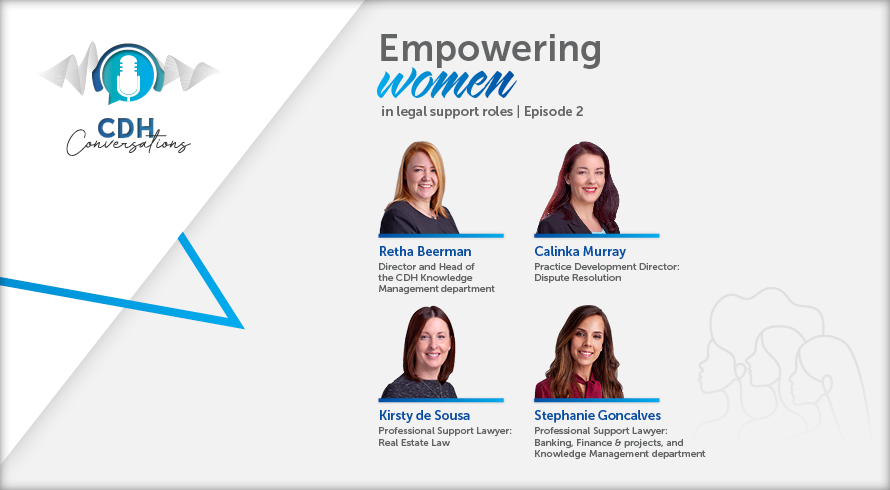What's in a name?
The incredible explosion of social media has resulted in most industry giants becoming more innovative in a world of expanding products and services. In a shrinking globally competitive market a trade mark can be the single most valuable asset of a company.
An extremely important feature of a trade mark is that it must have the ability to distinguish the relevant goods or services from other competitive goods or services of the same kind. In the event that a mark is devoid of a distinctive character and is merely a descriptive or generic term, it cannot be registered as a trade mark as competitors with the same marketing tendencies shouldn't be prevented from using descriptive terms for similar marks on related goods.
In the case of Discovery Holdings Limited v Sanlam Limited & Others2015 (1) SA 365 (WCC), the importance of a distinctive feature in a trade mark was highlighted. The Sanlam Group and the Discovery Group are direct competitors in the financial services market. Discovery Holdings Limited (Discovery), the applicant in this matter, was the registered owner of the trade mark 'Escalator Funds'.
During May 2011, Discovery conducted a search of the register for trade marks and discovered an application for the registration of a trade mark namely 'Sanlam Escalating Fund'. After conducting numerous internet searches, Discovery established that Sanlam Limited and Sanlam Life Insurance (Sanlam), had been using 'Sanlam Escalating Fund' and 'Escalating Fund' in relation to several of its financial products.
Discovery believed Sanlam's actions were an infringement of its trade mark and approached the court to restrain Sanlam from using its trade mark. In a counter application, Sanlam argued that the term 'Escalator Funds' was generic in nature and therefore should be removed from the trade mark register.
In making its judgement, the court emphasised that coined or inventive names are trade marks which enjoy the highest level of legal protection. These marks consist of words which have some dictionary meaning but which are used in connection with services unrelated to the dictionary meaning such as Apple for computers and Omega for watches.
When determining if the mark was descriptive, Judge Goliath held that, "the term Escalator Funds is nothing more than a simple combination of two ordinary English words." In addition, the court found that Discovery had failed to show consumer awareness of the mark 'Escalator Fund' apart from the fame associated with the Discovery mark. Standing alone, the registered mark 'Escalator Fund' therefore lacked commercial strength or market recognition.
In terms of the s34(1)(a) of the Trade Marks Act, No 194 of 1993 (Act), trade mark infringement is defined as the unauthorised use of an identical or confusingly similar trade mark in the course of trade in relation to goods or services which are either identical, or, as stated in s34(1)(b) of the Act, so similar to those in respect of which the trade mark is registered that such use is likely to cause deception or confusion.
The question is not whether the people will confuse the marks, but rather whether the marks will confuse people into believing that the goods they identify emanate from the same source. Judge Goliath stated that the mark Sanlam, added to the descriptive portion 'Escalating Fund', is the dominant feature of Sanlam's mark, and would be viewed as such by the average consumer. Therefore there would be no consumer confusion.
Finally, in a very interesting turn, the court decided in favour of Sanlam's counter-claim to remove the trade mark 'Escalator Funds' from the trade mark register. Judge Goliath confirmed that, "the notion of escalation and the related verb 'escalate' is a concept common to the financial services industry... [Discovery] can therefore not claim a monopoly of these terms to the exclusion of other traders who are entitled to offer products with the same obvious features." The court therefore held that Discovery's application be dismissed and its trade mark expunged from the register.
When approaching the courts for protection of its trade mark, the last thing Discovery expected was the removal of its mark from the register. It is therefore paramount to ensure that the trade mark name selected – whether it be associated with an innovative product, service or company - is unique to your brand and cannot be usurped by your competitors on the basis that it is generic to your market.
The information and material published on this website is provided for general purposes only and does not constitute legal advice. We make every effort to ensure that the content is updated regularly and to offer the most current and accurate information. Please consult one of our lawyers on any specific legal problem or matter. We accept no responsibility for any loss or damage, whether direct or consequential, which may arise from reliance on the information contained in these pages. Please refer to our full terms and conditions. Copyright © 2024 Cliffe Dekker Hofmeyr. All rights reserved. For permission to reproduce an article or publication, please contact us cliffedekkerhofmeyr@cdhlegal.com.
Subscribe
We support our clients’ strategic and operational needs by offering innovative, integrated and high quality thought leadership. To stay up to date on the latest legal developments that may potentially impact your business, subscribe to our alerts, seminar and webinar invitations.
Subscribe




